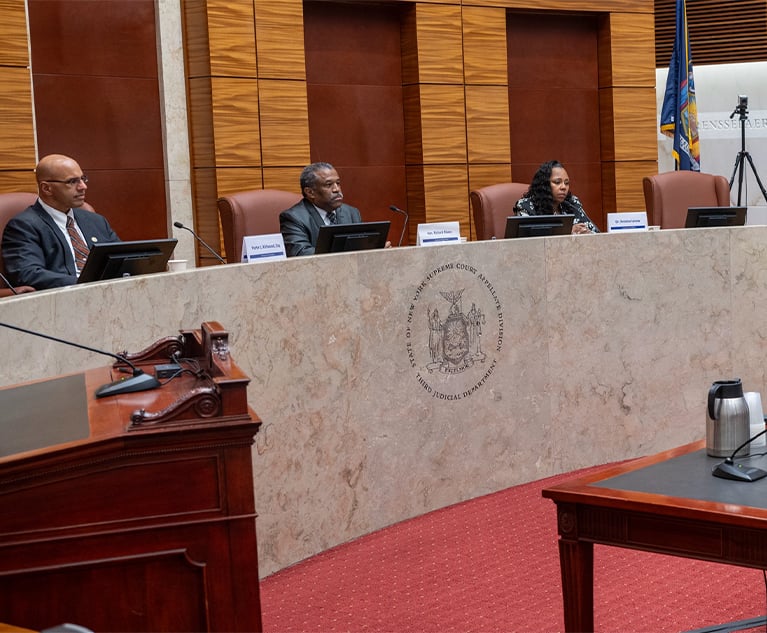Lawyers for Detained Immigrant Argue He's Entitled to Bond Hearing
Lawyers for a Haitian man who has been held by immigration authorities since September for convictions of turnstile jumping in New York City argued before a federal judge on Friday that their client should be entitled to a bond hearing at the six-month mark of his detention.
May 18, 2018 at 07:37 PM
3 minute read

Lawyers for a Haitian man who has been held by immigration authorities since September for convictions of turnstile jumping in New York City argued before a federal judge on Friday that their client should be entitled to a bond hearing at the six-month mark of his detention.
The proposed class action suit filed on behalf of Augustin Sajous, a 60-year-old permanent resident who has been in the United States since 1972, comes a few months after the U.S. Supreme Court ruled that federal immigration statutes do not give U.S. Immigration and Customs Enforcement detainees the right to a bond hearing, a decision which an immigration judge cited in ruling that Sajous remain locked up.
But lawyers from the New York Civil Liberties Union and Brooklyn Defender Services argue that denying Sajous a bond hearing violates his due process rights, that there should be a sixth-month “bright line” for immigrant detainees to receive bond hearings and that their position is backed by recent case law from the U.S. Court of Appeals for the Second Circuit.
“The longer that determination goes on, the more concerning it becomes for the court that it looks and feels like criminal detention,” said Andrea Sáenz, a supervising attorney for the immigration practice at Brooklyn Defender Services in oral arguments before U.S. District Judge Alison Nathan of the Southern District of New York.
Appearing for the government in the case, Assistant U.S. Attorney Brandon Waterman argued that Sajous is not an “outlier” in terms of the length of his detention in an ICE facility in New Jersey, though he could not provide a duration that would be considered the norm when asked by Nathan.
Waterman also argued that the length of Sajous' detention is “not determinative” of whether or not his case raises due process issues and, if a bond hearing is held, the burden should be placed on Sajous to prove that he should be freed, not the government.
During arguments by Jordan Wells, a staff attorney for the New York Civil Liberties Union who also appeared for Sajous, Nathan questioned why six months should be the time limit for bond hearings for immigrant detainees.
Wells argued that the Supreme Court has previously found that six months is a benchmark for civil commitment and that, under the Patriot Act, detainees held under suspicion that they pose threats to national security are subject to review every six months.
Sajous' lawyers have also filed a writ of habeas corpus on his behalf and have asked Nathan to order a preliminary injunction. Nathan reserved judgment on the motion.
This content has been archived. It is available through our partners, LexisNexis® and Bloomberg Law.
To view this content, please continue to their sites.
Not a Lexis Subscriber?
Subscribe Now
Not a Bloomberg Law Subscriber?
Subscribe Now
NOT FOR REPRINT
© 2025 ALM Global, LLC, All Rights Reserved. Request academic re-use from www.copyright.com. All other uses, submit a request to [email protected]. For more information visit Asset & Logo Licensing.
You Might Like
View All

Law Firms Expand Scope of Immigration Expertise Amid Blitz of Trump Orders
6 minute read
'Reluctant to Trust'?: NY Courts Continue to Grapple With Complexities of Jury Diversity
Trending Stories
Who Got The Work
J. Brugh Lower of Gibbons has entered an appearance for industrial equipment supplier Devco Corporation in a pending trademark infringement lawsuit. The suit, accusing the defendant of selling knock-off Graco products, was filed Dec. 18 in New Jersey District Court by Rivkin Radler on behalf of Graco Inc. and Graco Minnesota. The case, assigned to U.S. District Judge Zahid N. Quraishi, is 3:24-cv-11294, Graco Inc. et al v. Devco Corporation.
Who Got The Work
Rebecca Maller-Stein and Kent A. Yalowitz of Arnold & Porter Kaye Scholer have entered their appearances for Hanaco Venture Capital and its executives, Lior Prosor and David Frankel, in a pending securities lawsuit. The action, filed on Dec. 24 in New York Southern District Court by Zell, Aron & Co. on behalf of Goldeneye Advisors, accuses the defendants of negligently and fraudulently managing the plaintiff's $1 million investment. The case, assigned to U.S. District Judge Vernon S. Broderick, is 1:24-cv-09918, Goldeneye Advisors, LLC v. Hanaco Venture Capital, Ltd. et al.
Who Got The Work
Attorneys from A&O Shearman has stepped in as defense counsel for Toronto-Dominion Bank and other defendants in a pending securities class action. The suit, filed Dec. 11 in New York Southern District Court by Bleichmar Fonti & Auld, accuses the defendants of concealing the bank's 'pervasive' deficiencies in regards to its compliance with the Bank Secrecy Act and the quality of its anti-money laundering controls. The case, assigned to U.S. District Judge Arun Subramanian, is 1:24-cv-09445, Gonzalez v. The Toronto-Dominion Bank et al.
Who Got The Work
Crown Castle International, a Pennsylvania company providing shared communications infrastructure, has turned to Luke D. Wolf of Gordon Rees Scully Mansukhani to fend off a pending breach-of-contract lawsuit. The court action, filed Nov. 25 in Michigan Eastern District Court by Hooper Hathaway PC on behalf of The Town Residences LLC, accuses Crown Castle of failing to transfer approximately $30,000 in utility payments from T-Mobile in breach of a roof-top lease and assignment agreement. The case, assigned to U.S. District Judge Susan K. Declercq, is 2:24-cv-13131, The Town Residences LLC v. T-Mobile US, Inc. et al.
Who Got The Work
Wilfred P. Coronato and Daniel M. Schwartz of McCarter & English have stepped in as defense counsel to Electrolux Home Products Inc. in a pending product liability lawsuit. The court action, filed Nov. 26 in New York Eastern District Court by Poulos Lopiccolo PC and Nagel Rice LLP on behalf of David Stern, alleges that the defendant's refrigerators’ drawers and shelving repeatedly break and fall apart within months after purchase. The case, assigned to U.S. District Judge Joan M. Azrack, is 2:24-cv-08204, Stern v. Electrolux Home Products, Inc.
Featured Firms
Law Offices of Gary Martin Hays & Associates, P.C.
(470) 294-1674
Law Offices of Mark E. Salomone
(857) 444-6468
Smith & Hassler
(713) 739-1250







